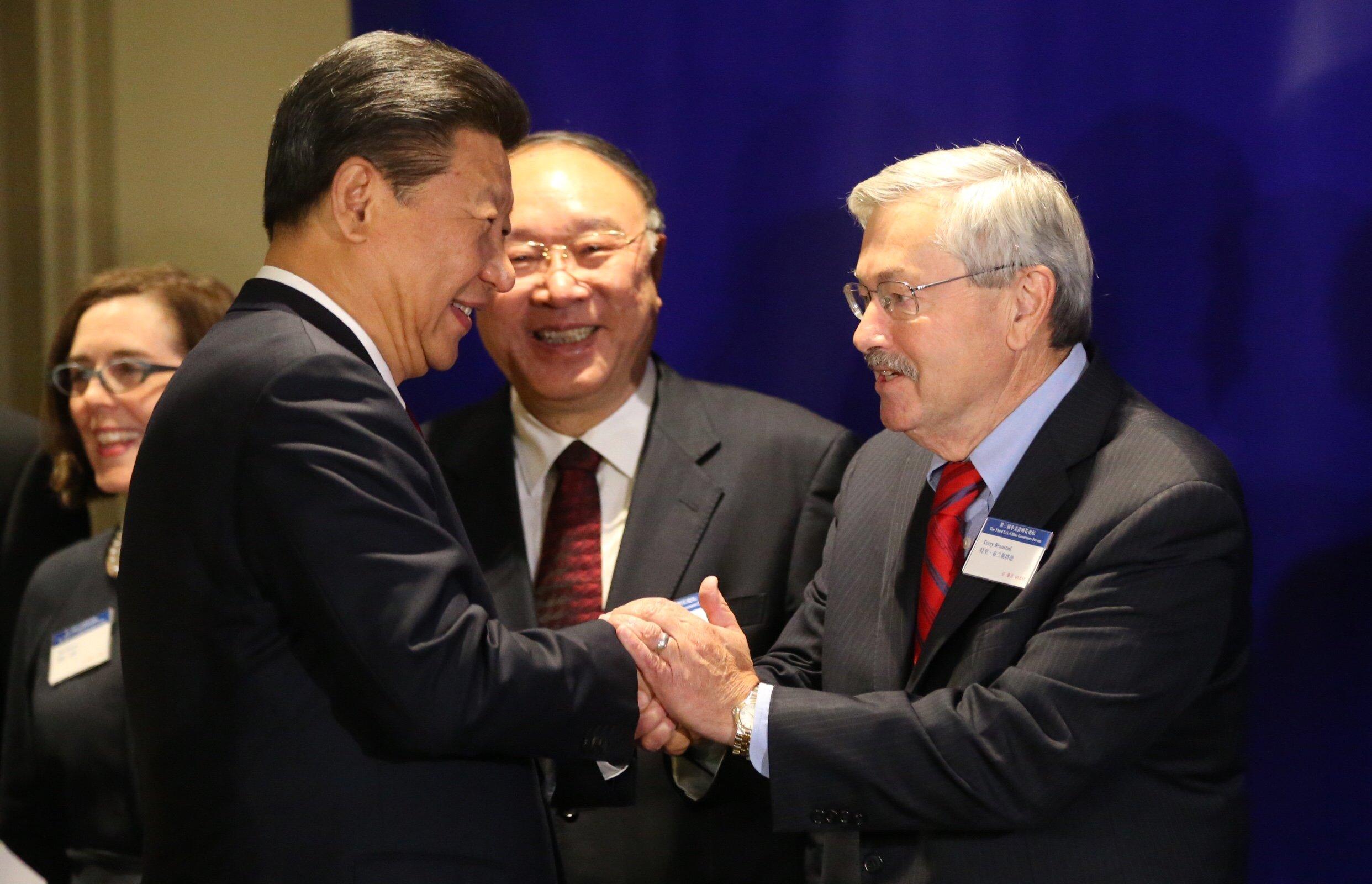Donald Trump appoints China's 'old friend' Iowa governor Terry Branstad as US ambassador
The appointment is a first step to assuaging fears of a worsening relationship between the two nations once Mr Trump enters the White House

US President-elect Donald Trump has named the Republican governor of Iowa Terry Branstad as ambassador to China, according to his transition team.
Mr Branstad's nomination goes some way to assuaging fears that a Trump administration could adversely affect US-Chinese relations. In Beijing, Foreign Ministry spokesman Lu Kang called Mr Branstad an “old friend” of China when asked about the appointment.
The governor’s friendship with the Chinese leader dates back to 1985, when Xi Jinping visited Iowa as a young agricultural official.
The two met again in recent years; in 2011 when Mr Branstad travelled to China, and again in 2012 when Mr Xi stopped in Iowa during a state visit to the US. Mr Branstad called Mr Xi a “longtime friend” during that visit, which came only nine months before Mr Xi became the Chinese leader.
Mr Lu said: “The US ambassador to China is an important bridge between the US government and the Chinese government. No matter who is in this position, we are willing to work with him to push forward the sound and steady development of Sino-US relations.”
While Mr Branstad would seemingly be received warmly by Chinese officials, the need for delicate diplomacy is clear. On the campaign trail this year, Mr Trump repeatedly criticised China for encouraging unfair competition in international trade and has threatened Chinese companies that do not “behave” with punitive tariffs.
A recent call between Mr Trump and Taiwan’s Tsai Ing-wen brought a diplomatic protest from Beijing as it broke with decades of established US policy.
No American president had had any direct diplomatic contact with a Taiwanese leader since President Jimmy Carter switched its recognition from Taiwan to Beijing in 1979. Under the so-called "one China" doctrine – which the US agreed to uphold – Beijing considers the island off its south-eastern coast to be a breakaway province. The US still holds unofficial ties with Taiwan.
Mr Trump said that he had accepted the call from Ms Tsai, although the Taiwan leader’s office said there had been contact between the sides to arrange the call. The 10-minute conversation raised fears of an angry response from Beijing – with Taiwan calling for "calm" – but despite the diplomatic protest, a full-scale war of words failed to materialise. However, the contact took the White House by surprise and the Obama administration moved quickly to assure Beijing that there were no plans to change the "one China" policy.
In the wake of the call, Mr Trump took to Twitter to accuse the Chinese government of potential currency manipulation and aggressively building up its military presence in the disputed territories of the South China Sea.
Mr Branstad had visited Trump Tower on Tuesday afternoon but refused to comment on whether he had been offered a post.
"I’m really excited about the quality of people that he’s attracting to the cabinet," Mr Branstad said. "I’m very proud to have supported Donald Trump for President."
Mr Branstad regularly campaigned with Mr Trump in his home state of Iowa – a key battleground state – during the presidential election. Mr Trump will travel to Iowa on Thursday as part of his post-election victory tour and Mr Branstad could join him during an appearance in Des Moines.
In another apparent appointment, the President-elect has chosen retired Marine General John Kelly, whose last command included oversight of the Guantanamo Bay detention centre, to run the Department of Homeland Security, people close to the transition team said on Wednesday.
Gen Kelly, who joined the Marine Corps in 1970, retired earlier this year, wrapping up a final, three-year post as head of US Southern Command in a period that coincided with some of the more fractious debate over the Obama administration's ultimately failed pledge to close Guantanamo.
Meanwhile, Mayors of big cities across the US have appealed to Donald Trump to let child immigrants stay in the country, go to school and not live in fear of deportation.
During a meeting with Chicago mayor Rahm Emanuel, the President-elect was handed a letter signed by more than a dozen mayors, asking him to keep accepting renewals and applications for the Deferred Action for Childhood Arrivals (DACA) programme.
“[…] DACA helps ensure that young people that were brought to the United States before they turned 16, and are actively seeking higher education, working or engaged in military service, can stay in their homes and communities without fear of deportation,” the letter read.
It was signed by mayors including Bill de Blasio from New York, Eric Garcetti of Los Angeles and Megan Barry of Nashville.
Subscribe to Independent Premium to bookmark this article
Want to bookmark your favourite articles and stories to read or reference later? Start your Independent Premium subscription today.

Join our commenting forum
Join thought-provoking conversations, follow other Independent readers and see their replies